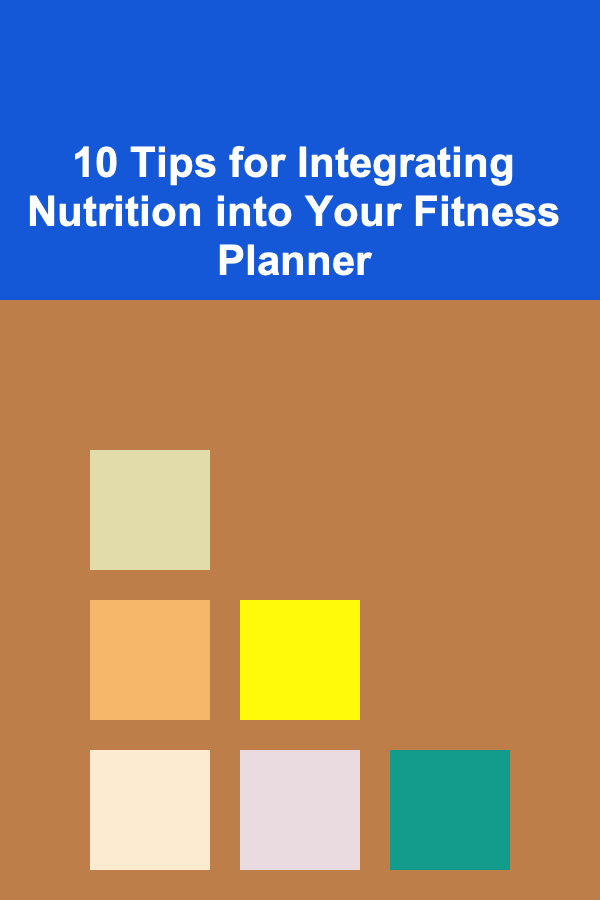
10 Tips for Integrating Nutrition into Your Fitness Planner
ebook include PDF & Audio bundle (Micro Guide)
$12.99$8.99
Limited Time Offer! Order within the next:

When it comes to achieving a balanced and sustainable lifestyle, fitness and nutrition go hand in hand. While exercise builds strength, stamina, and muscle, nutrition fuels the body and aids in recovery, making it an essential part of any fitness journey. If you're serious about improving your health, integrating nutrition into your fitness planner is a vital step that will help you see better results, stay on track, and maintain your progress over time.
A fitness planner can be an invaluable tool to track workouts, goals, and progress, but it often lacks a dedicated space for meal planning and nutritional guidance. By adding nutrition to your fitness planner, you create a holistic approach that supports both your fitness and health goals. In this article, we'll explore 10 tips to help you seamlessly integrate nutrition into your fitness planner, making it easier to stay accountable and make healthier choices along the way.
Create a Nutritional Goals Section
Just like setting fitness goals, it's important to define specific nutritional goals that align with your overall fitness objectives. A clear goal helps you stay focused and gives you something to strive for.
Example Nutritional Goals:
- Weight Loss: Track calories and macronutrients (protein, carbs, and fats) to ensure you're eating at a caloric deficit.
- Muscle Gain: Increase protein intake to support muscle growth and recovery.
- Improved Energy: Focus on nutrient-dense meals to sustain energy throughout your workouts and daily activities.
- Balanced Diet: Aim for a balanced intake of fruits, vegetables, whole grains, lean proteins, and healthy fats.
By defining your nutritional goals, you'll have a foundation to guide your meal planning and track progress in your planner. Make sure these goals are aligned with your overall fitness objectives for the best results.
Incorporate Meal Prep and Planning
Meal prep is one of the most effective strategies to ensure that your nutritional needs are met throughout the week. By planning your meals ahead of time, you can ensure that you're eating the right foods in the right portions. Incorporating meal planning into your fitness planner will save you time, reduce the likelihood of making unhealthy food choices, and help you stay on track with your fitness and nutrition goals.
Meal Prep Tips:
- Plan meals for the week: Dedicate a page in your planner to outline breakfast, lunch, dinner, and snacks for each day of the week.
- Batch cooking: Cook large portions of meals that can be stored and reheated throughout the week to save time.
- Balance macronutrients: Ensure each meal contains a good balance of protein, healthy fats, and carbohydrates to fuel your workouts and recovery.
Incorporating meal planning into your fitness routine helps you stay disciplined and ensures that nutrition isn't an afterthought.
Track Macronutrients and Micronutrients
One of the most powerful ways to monitor your nutrition is by tracking macronutrients (proteins, fats, and carbohydrates) and micronutrients (vitamins and minerals). These are the building blocks of your diet and have a direct impact on your performance and recovery.
How to Track Macronutrients:
- Protein: Essential for muscle repair and growth. Aim for approximately 1.2 to 2.2 grams of protein per kilogram of body weight, depending on your fitness goals.
- Carbohydrates: Carbs are the body's primary energy source, especially during high-intensity workouts. The recommended intake is generally 3--7 grams of carbs per kilogram of body weight for athletes.
- Fats: Healthy fats support hormone production and provide long-lasting energy. Aim for 0.8 to 1 gram of fat per kilogram of body weight.
Tracking Micronutrients:
While tracking macronutrients is common, it's also crucial to focus on micronutrients such as vitamins and minerals. These support everything from immune function to muscle contraction. Ensure your diet is rich in a variety of colorful fruits and vegetables to get a broad spectrum of micronutrients.
Use your fitness planner to jot down the number of grams or servings of each macronutrient and note any micronutrient-rich foods you're consuming.
Log Daily Hydration
Hydration is often overlooked, but it's an essential component of both fitness and nutrition. Water is involved in almost every process in the body, including digestion, nutrient absorption, and muscle recovery. Dehydration can negatively affect your workouts and overall well-being.
To integrate hydration into your fitness planner:
- Track your daily water intake: Set a goal for daily hydration and track the amount of water you consume. Aim for at least 8 glasses (64 ounces) of water a day, or more if you're highly active.
- Include hydration reminders: Write down reminders to drink water throughout the day, especially before, during, and after your workouts.
By actively tracking hydration in your fitness planner, you can ensure you're meeting your hydration goals and staying properly fueled.
Add Post-Workout Nutrition Notes
What you eat after a workout is just as important as your pre-workout meal. Post-workout nutrition plays a critical role in recovery by replenishing glycogen stores, repairing muscle tissue, and preventing muscle breakdown.
Include a section in your fitness planner to track post-workout nutrition. A balanced post-workout meal should include:
- Protein: To support muscle recovery.
- Carbohydrates: To replenish glycogen stores.
- Healthy fats: To support hormone function and recovery.
Examples of good post-workout meals:
- Grilled chicken with quinoa and steamed broccoli.
- A protein shake with a banana and almond butter.
- Salmon with sweet potatoes and spinach.
By noting down what you eat after your workouts, you can ensure your body is getting the right nutrients to recover properly and perform better in future workouts.
Track Nutrient Timing Around Workouts
Nutrient timing refers to consuming specific nutrients at optimal times to maximize performance and recovery. Integrating nutrient timing into your fitness planner can help you achieve your fitness goals more efficiently.
Key Nutrient Timing Tips:
- Pre-workout: Aim to consume a balanced meal 1--2 hours before exercising. Focus on a combination of complex carbs, protein, and a small amount of fat for sustained energy.
- Post-workout: Consume a protein-rich meal or shake within 30--60 minutes after finishing your workout to kickstart muscle recovery.
By including sections for pre-workout and post-workout meals in your fitness planner, you can be intentional about when and what you eat to optimize your performance.
Include Healthy Snack Options
Snacking is often seen as a negative aspect of nutrition, but healthy snacks can help maintain your energy levels and prevent overeating at main meals. Include a list of healthy snack options in your fitness planner to help you make smarter choices when hunger strikes.
Healthy Snack Ideas:
- Greek yogurt with berries and nuts.
- Apple slices with almond butter.
- Veggies and hummus.
- Hard-boiled eggs.
- Cottage cheese with pineapple.
Having a set list of healthy snacks on hand makes it easier to avoid unhealthy options and stay on track with your nutrition goals.
Include Cheat Meals and Flexibility
Strict diets can be difficult to maintain in the long term. It's important to build some flexibility into your nutrition plan to allow for occasional indulgences without derailing your progress.
Allow yourself cheat meals or treats in moderation, but make sure to track them in your fitness planner. This helps you stay accountable and ensures you don't feel guilty about enjoying your favorite foods.
When planning for cheat meals:
- Plan ahead: Ensure that your workout and meal plans accommodate your cheat meal.
- Limit portions: Enjoy your cheat meal, but keep portion sizes in check.
- Stay mindful: Don't let one cheat meal turn into a week of indulgence.
By allowing for balance, you can stay motivated while maintaining consistency in your nutrition.
Monitor Energy Levels and Adjust as Needed
Your energy levels are a direct reflection of the balance between your workouts, nutrition, and recovery. Monitoring your energy in your fitness planner can help you identify when you might need to adjust your diet.
Energy Tracking Tips:
- Rate your energy: At the end of each day, rate your energy levels from 1--10. This can help you pinpoint any areas where your nutrition might be lacking.
- Adjust macronutrients: If you're feeling fatigued during workouts or throughout the day, you may need to adjust your macronutrient ratios, especially carbs and protein.
By tracking your energy levels, you can make more informed decisions about your diet and fine-tune it for optimal performance.
Review and Reflect on Your Progress
Finally, regularly review and reflect on your nutrition and fitness progress in your planner. Tracking your meals, energy, and progress over time will help you spot patterns and make necessary adjustments.
Reflection Questions:
- Have I met my nutritional goals this week?
- What meals or snacks made me feel energized?
- Did I make time for meal prep or did I rely on convenience foods?
- How did my nutrition impact my workout performance?
By setting aside time each week or month to review your progress, you can make small improvements and continue moving forward in your fitness and nutrition journey.
Integrating nutrition into your fitness planner is a powerful tool that will help you achieve your health and fitness goals more effectively. By tracking your meals, setting clear nutrition goals, and making adjustments based on your progress, you'll create a more holistic approach to wellness. Whether you're aiming for weight loss, muscle gain, or simply a balanced, healthy lifestyle, the synergy between nutrition and fitness is key to long-term success. So, grab your fitness planner and start planning your way to a healthier, more balanced life today.
Reading More From Our Other Websites
- [Organization Tip 101] Comparing Popular Smart Home Security Camera Brands: Which One is Right for You?
- [Personal Financial Planning 101] How to Save More Money: Strategies for Building Wealth Over Time
- [Organization Tip 101] How to Create a Resource Hub for All Your Courses
- [Home Soundproofing 101] How to Soundproof Your Home for Music Production
- [Home Rental Property 101] How to Stay Compliant with Local Rental Property Laws
- [Home Holiday Decoration 101] How to Decorate Your Fireplace Mantel for the Perfect Holiday Look
- [Organization Tip 101] How to Transform a Toy Room into an Organized Sanctuary
- [Personal Care Tips 101] How to Choose a Hair Mask for a Complete Hair Care Routine
- [Home Staging 101] How to Incorporate Home Staging Trends Without Making Your Home Look Dated in 5 Years
- [Personal Care Tips 101] How to Care for Your Perfume and Keep It Fresh

How to Start Saving Money on Pet Food and Supplies Without Compromising Quality
Read More
How To Use Biometric Data for Productivity Insights
Read More
How to Pick the Perfect Comedy for a Laugh
Read More
How to Photograph Architectural Details
Read More
How to Shop for Gifts for Difficult People: A Comprehensive Guide
Read More
10 Tips for a Minimalist Cleaning Schedule
Read MoreOther Products

How to Start Saving Money on Pet Food and Supplies Without Compromising Quality
Read More
How To Use Biometric Data for Productivity Insights
Read More
How to Pick the Perfect Comedy for a Laugh
Read More
How to Photograph Architectural Details
Read More
How to Shop for Gifts for Difficult People: A Comprehensive Guide
Read More